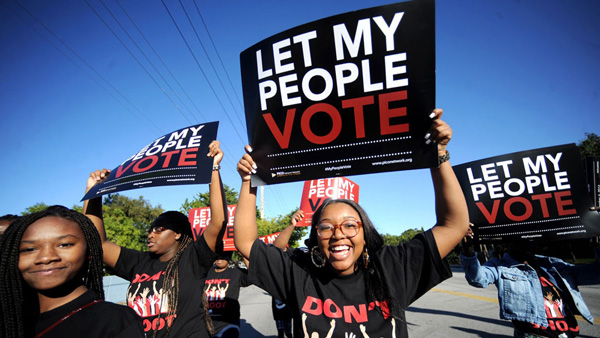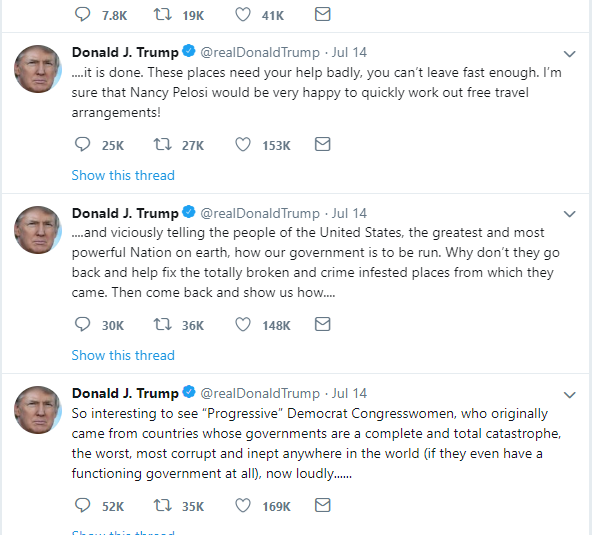Before getting into all the things I’d like to say to John Delaney and Tim Ryan just before leaving them alone in a cold and desolate wilderness with no matches or shoes, some general comments on last night’s debate:
One, MSNBC did a much better job moderating the June debate. CNN seems to think it was moderating America’s Ninja Warrior; it was more yelling and drama than substance. I agree with Joshua Holland, Bad moderation and a flood of conservative talking points made Tuesday’s Dem debate almost unwatchable.
The Vox editorial team even listed the Republican Party as one of the night’s winners:
If you were Donald Trump or another Republican lawmaker running for reelection in 2020, you probably had a good time watching Tuesday night’s debate. Several of the major issues were framed by the moderators in terms Republicans would love: Will you take private insurance from Americans to give them Medicare-for-all? Will you raise taxes on the middle class to do it? Will you decriminalize illegal border crossings and give unauthorized immigrants free health care? Are Democrats going too far to the left?
The extremely tight time limits, in which candidates could barely begin speaking before Jake Tapper cut them off, favored talking points over substance. The entire evening, from the razz-ma-tazz, rah rah patriotism introduction to the end, seemed more like a frantic game show than a debate. Clearly, CNN was going for “optics,” for entertainment, not for informing the public.
See also CNN’s Debate Questions Were for Losers and Attack of the Mini-Bidens, both at Slate.
I’m not looking forward to what they present tonight except to predict Jake Tapper will go easier on Joe Biden than he did on Liz Warren. Just watch. Fortunately Warren was savvy enough to be one of the evening’s winners, in spite of being set up for an ambush. The lady has skills. Bernie Sanders also did a bit better than in the first debate, I thought.
Now, on to Delaney and Ryan. Which is not to say I don’t have equally low opinions of John Hickenlooper and Steve Bullock, but they didn’t piss me off as much last night as Delaney and Ryan. Here is Delaney’s opening statement:
DELANEY: Folks, we have a choice. We can go down the road that Senator Sanders and Senator Warren want to take us, which is with bad policies like Medicare for all, free everything and impossible promises that will turn off independent voters and get Trump re-elected. That’s what happened with McGovern. That’s what happened with Mondale. That’s what happened with Dukakis. Or we can nominate someone with new ideas to create universal health care for every American with choice, someone who wants to unify our country and grow the economy and create jobs everywhere. And then we win the White House.
Got that? He’s channeling the fears of all Third Way – Democratic Leadership Council – neoliberal and “centrist” Democrats who turned FDR’s Democratic party into Republican Party Lite. We can’t have single payer health care because George McGovern lost to Richard Nixon in bleeping 1972.
Delaney was called out last week in a Paul Waldman column for perpetrating Republican talking points about Medicare for All. “We should have universal health care, but it shouldn’t be the kind of health care that kicks 150 million Americans off their health care,” Delaney had said. What he means is that people with employer-based health insurance love their health insurance and want to keep it. But it sounds as if he’s saying Medicare for All would take health insurance away from people. Waldman wrote,
The generous interpretation of this line is that it’s warning about widespread disruption; the other interpretation is that it’s meant to stoke the fear that if you now have coverage and single payer passes, you could be left with no insurance at all, which is just false. If we passed single payer, you’d move from your current plan to a different plan, one that depending on how it’s constructed would probably offer as good or better coverage at a lower cost.
Delaney was back on the same point last night —
DELANEY: Well, I’m right about this. We can create a universal health care system to give everyone basic health care for free, and I have a proposal to do it. But we don’t have to go around and be the party of subtraction, and telling half the country, who has private health insurance, that their health insurance is illegal. My dad, the union electrician, loved the health care he got from the IBEW. He would never want someone to take that away. …
…SANDERS: The fact of the matter is, tens of millions of people lose their health insurance every single year when they change jobs or their employer changes that insurance. If you want stability in the health care system, if you want a system which gives you freedom of choice with regard to a doctor or a hospital, which is a system which will not bankrupt you, the answer is to get rid of the profiteering of the drug companies…
TAPPER: Thank you, Senator.
SANDERS: … and the insurance companies, move to Medicare for all.
(CROSSTALK)
TAPPER: Congressman Delaney?
DELANEY: But now he’s talking about a different issue. What I’m talking about is really simple. We should deal with the tragedy of the (ph) uninsured and give everyone health care as a right. But why do we got to be the party of taking something away from people?
Delaney kept evoking union workers and reminding listeners his dear old dad loved his benefits. Well, my dad was a union guy, too, and those benefits were great for the family and for my parents in their old age. But what about the enormous majority of U.S. employees who are not unionized? And what happens to benefits when factories close or workers are laid off? Which happens a lot.
Tim Ryan also wanted everyone to know that union workers want to keep their union benefits.
RYAN: So here we are in Detroit, home of the United Auto workers. We have all our union friends here tonight. This plan that’s being offered by Senator Warren and Senator Sanders will tell those Union members who gave away wages in order to get good healthcare that they’re going to lose their healthcare because Washington’s going to come in and tell them they got a better plan.
As Jonathan Tasini wrote on Facebook, in recent decades unions have had to make major concessions on wages and working conditions in order to keep the health benefits. This is, Tasini says, a big reason for the meager raises workers have had to accept. An argument could be made that de-coupling health care from employment would be good for unions and workers.
Delaney’s other lie, which he has told before, is that Medicare for All would cause widespread hospital closings.
DELANEY: Listen, his math is wrong. That’s all I’m saying — that his math is wrong, it’s been well-documented that if all the bills were paid at Medicare rate, which is specifically — I think it’s in section 1,200 of their bill, then many hospitals in this country would close.
I’ve been going around rural America, and I ask rural hospital administrators one question, “If all your bills were paid at the Medicare rate last year, what would happen?”
And they all look at me and say, “We would close.”
But the question is, why do we have to be so extreme? Why can’t we just give everyone health care as a right, and allow them to have choice?
Delaney got Four Pinnochios from the Washington Post for a similar statement earlier this month. The problem with Delaney’s claim is that it ignores one of the primary reason hospitals are closing now, which is not because of Medicare rates, but because of the number of people who are treated and can pay nothing. This is a widespread problem in all impoverished rural areas, but hospitals in states that did not expand Medicaid are especially hard hit.
Hospitals in rural areas are losing money and sometimes closing down, taking away jobs and limiting health care options for some of the nation’s poorest citizens, according to a study published earlier this week by the Pittsburg Morning Sun and GateHouse Media. And the decision to reject a key part of Obamacare by Republican politicians in red states is exacerbating the problem.
The hospital closure crisis is most pronounced in states that have declined Medicaid expansion, the policy in the Affordable Care Act that offers coverage for individuals whose income is at or below 138 percent of the federal poverty line. Of the 106 rural hospitals that have shut down since 2010, 77 were located in states that hadn’t expanded Medicaid, the study found.
The dirty secret behind health care costs is that health insurance premiums and medical bills are jacked up to cover the costs of non-paying patients. So those who do pay are shelling out a hefty surcharge to keep the system afloat. Delaney’s argument assumes that hospitals would be deprived of their surcharges, but if treatment for all patients were compensated, the equation changes considerably.
To Delaney’s question, why do we have to be so extreme? Why can’t we just give everyone health care as a right, and allow them to have choice? — rights one cannot exercise aren’t rights at all. If we call health care a “right” but don’t provide a means for people to obtain it, what’s the point? Delaney’s health care position is, IMO, no more or less pie-in-the-sky than Bernie Sanders’s.
Delaney sees himself as the adult in the room on a major issue — health care — for the Democratic primary debate. He has a universal health care plan, though it is more limited in benefits and scope than single payer plans. (He is also, notably, still heavily invested in the health care industry; about $3.2 million of his $280 million fortune comes from the health care sector, per Sludge.)
Now, let’s switch back to Ryan:
RYAN: Now in this discussion already tonight we’ve talked about taking private health insurance away from union members in the industrial Midwest, we’ve talked about decriminalizing the border, and we’ve talked about giving free healthcare to undocumented workers when so many Americans are struggling to pay for their healthcare.
In the post-debate spin room, Ryan could be heard repeating the charge that undocumented workers shouldn’t be getting “free” health care while citizens have to work to earn it. But the people proposing that undocumented workers should be able to receive health care are proposing some form of single-payer system, meaning that we are de-coupling employment and health insurance and instead paying for health care through taxes. And undocumented workers pay a ton of taxes — billions in taxes, it says here. Undocumented workers wouldn’t be getting anything “free” that citizens also aren’t getting “free.”
And the fact is that undocumented workers are going to get health care from the health care system — not good, preventative care, but they’ll be taken to trauma centers when they are injured on construction sites. And are we going to let women in labor give birth on the streets? Are we going to leave undocumented children unvaccinated (bad idea) or babies sick with flu untreated? I doubt that, which takes us back to the costs of uncompensated care. Ryan (or maybe it was Delaney) kept blathering that undocumented people can just pay for health care, but people living on subsistence wages are not in a position to do that. Do we let them die? Do we let their children die?
Of course, this touches on the undocumented immigrants issue and the need for comprehensive reform that would stop forcing law-abiding people into hiding. It shouldn’t be that hard for a person who has been living and workng here to obtain some kind of official status. And then, voila! They are documented! Why is that so hard? Why is forcing people to stay underground better?
It wasn’t just Ryan and Delaney being stupid last night. Paul Waldman wrote this today:
Did you know that if liberals get their way and pass Medicare For All, you’ll have to actually pay for health coverage for the first time, when obviously everyone now gets it for free?
That was what you would have thought if you knew nothing about health care and listened to the way Jake Tapper of CNN framed the question during the Democratic presidential candidate debate on Tuesday night. And it showed just how difficult it is to have a meaningful, informative debate about a complex policy issue when the media are so determined to focus on squabbling and “newsworthy” moments.
Those moments usually happen when a candidate says something that they’ll be criticized for, often when their comments are taken out of context. So in the debate, Tapper relentlessly demanded to know whether taxes could increase for the middle class if health care reform was passed, as though that is the only real question worth considering. He asked Elizabeth Warren if she’d have to raise taxes, twice. He asked Pete Buttigieg, also twice. He asked Beto O’Rourke.
Seriously obnoxious. Tapper should be in the cold, desolate wilderness also. No shoes, no matches, no signal, not even a granola bar. Tapper kept going to Delaney to get him to challenge the front runners, and on a split screen Delaney would smirk and grimmace and smile the fake smile of someone who has been told to smile on television but doesn’t really want to. I do not like him. He needs to go away.
And after all the stupid shit Ryan said yesterday? What is he being called out for today in our dear mass media? He didn’t put his hand over his heart for the national anthem. Argh.

July 30, 2019 – Detroit, Michigan, United States: CNN Democratic Presidential Debate Detroit, Michigan 2019. L to R: Candidate author Marianne Williamson, Ohio Rep. Tim Ryan, Minnesota US Sen. Amy Klobuchar South Bend, Indiana, Mayor Pete Buttigieg, Vermont US Sen. Bernie Sanders, Massachusetts US Sen. Elizabeth Warren, former Texas Rep. Beto O’Rourke, former Colorado Gov. John Hickenlooper, former Maryland Rep. John Delaney, Montana Gov. Steve Bullock. (John Nowak / CNN / Polaris)








